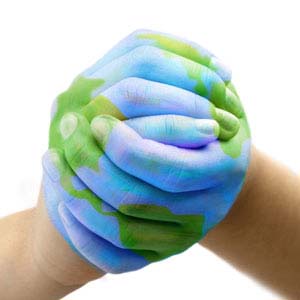Are you an Eco-citizen? Questionnaire I, External Ecology
16 de Maio de 2018, 17:26 - sem comentários ainda | Ninguém está seguindo este artigo ainda. 
Are you an Eco citizen?
This questionnaire is a tool that we use in the training process provided by the School of Integrative Ecology. It refers to your daily practices and behaviors, as well as your vision of the world. It is useful for anyone who wants to assess their level of eco-citizenship practice in their daily life. Ask yourself questions and plan your transition to a more sustainable life!
Do you usually sort your waste separately?
- Yes, I reduce my waste as much as possible, I completely separate each material (glass, metal, paper and plastic) for recycling and I compost my organic waste;
- I separate organic waste from recyclable waste, but perhaps I should pay more attention to it. I compost organic waste myself;
- I would like to collaborate in waste recycling programs, but I have not yet organized.
How do you manage your water consumption?
- I know how much water I use (in volume/day); I have reduced my consumption when I take a bath, brush my teeth, use the dishwasher or washing machine and clean, and I don't waste water;
- I have already made efforts to reduce my water consumption for personal hygiene, I use my clothes longer, but I know that I can still improve my behavior;
- I perceive the importance and symbolism of water, but I have not yet changed my habits.
How do you manage your use of electrical energy?
- I measured my energy consumption in kWh/month. I avoid taking baths too hot and too often. I turn off unused lights or electrical appliances, whether at home or at work. I don't waste energy;
- I have already made progress towards a better awareness of my use of electrical energy, but I am still changing my practices;
- When I am in contact with people or readings that have to do with sustainability, I feel involved, but when it comes to my daily behavior, I forget.
What are your consumers habits regarding clothing, shoes and accessories?
- I buy new items only to replace those that are no longer usable and I give priority to their repair and makeover;
- I sometimes buy to replace, to have more suitable options and to have some new features;
- It is important for me to be in harmony with the atmosphere in which I live and I renew my wardrobe to stay fashionable.
What is your relationship with nature?
- When I observe the environment, I normally perceive the presence of insects and birds, if the plants that surround me are thirsty, the evolution of the moon phases, the small daily changes of the seasons, the movements of clouds and winds, etc;
- When I am in moments of leisure and vacation, I become aware of the nature that surrounds me;
- I am a big fan of nature, but I am not familiar with the relationship with the natural environment.
How do you connect with your own body?
- I practice my body consciousness daily, with meditations or movement practices. I observe what I eat and drink, I regularly look at my urine and stools, I am aware of my interaction with the cold and the hot, I feel what causes certain dysfunctions in my body, etc;
- I exercise regularly, try to eat healthy foods and avoid unhealthy foods, but my body consciousness is not continuous over time;
- My connection with my body is not developed enough and I have health problems whose origins I do not understand.
With regard to your ecological footprint, how do you compensate for the excessive use of natural resources?
- I measure my ecological footprint annually, balance my excess by planting trees and try to train myself to constantly reduce my CO2 emissions;
- I have already measured my ecological footprint and taken measures to offset it, but this practice is not yet an integral part of my life;
- The idea of measuring my ecological footprint and compensating for it is not yet very clear to me.
What is your perception of the current climate crisis and how do you see your own future?
- I am sufficiently informed, I am aware of the gravity of the situation and I project myself into the future with a resilient and ecological life, already experimenting, when possible, this new lifestyle;
- Although I am informed and aware, I do not yet have a personal project for my future that incorporates environmental degradation;
- I avoid thinking about it, because I have the feeling that the information available is not yet clear enough, or when I face the scale of the problems I remain frozen.
How do you perceive your diet?
- Feeding myself is the most regular action that connects me to Nature and the world, so I practice it consciously and ritually. I make choices that respect my body and other living things and honor those who produced the food;
- I have slowed down my consumption of industrialized foods, I try to eat less contaminated products and avoid meat, drink more water and be aware of my weight;
- I know the importance of what I eat for myself and for the rest of the world, but the strength of my habits strongly determines my diet.
What is your attitude towards buying and using objects in general?
- I am aware of the social pressure for consumption and I only buy the things I need. I reduce the amount of items in my possession (donate, recycle or set aside those I don't need), and adopt a simpler lifestyle by taking care of and repairing what's mine, to avoid waste;
- I notice that I have more than I need and therefore I buy less and less, I prefer to repair and recycle, I use reusable bags, I avoid packaging, etc;
- I know that there are marketing strategies implemented by capitalist society to push us to consumption and I try to fight against them.
What is your preferred mode of transportation?
- Walking is my first choice, when possible. I also use bicycles, motorcycles and public transport. When I use a car, I look for the least polluting energy, I organize carpooling and I always do my shopping nearby;
- The car is my main means of transport, but I have changed my habits to travel more locally, avoiding long distances as much as possible;
- I am aware that I am not moving in a sustainable way, but I have not yet managed to change my routine.
How do you organize your habitat in a sustainable way?
- I use natural lighting and ventilation, I collect solar energy and rainwater, I have a garden, I compost, I share the use of the house and meals with other people to reduce the environmental impact, etc;
- To gradually reduce the environmental impact of my lifestyle in my home, I have implemented measures, such as reducing my water and energy consumption, raising awareness of household chemicals, etc;
- I live in conventional housing and have great difficulty establishing a more sustainable lifestyle around me.
What is your level of social involvement?
- I am involved in socio-environmental movements and organizations and I also try to set an example. I help people who ask for advice on their life choices;
- I focus on my own example and, when I can, I help others in their life choices;
- I am aware of the urgent need for large-scale social change, but the strength of my habits still largely limits my commitment.
What is your understanding of "deep ecology", or sustainability understood as respect for the sacred of Nature?
- I perceive the elements (water, earth, fire and air) as sacred and everything around me as the fruit of Nature's generosity. In practicing meditative silence, I am grateful for the privilege of sharing this abundance;
- I have changed my behavior by being more attentive to the web of life in which I am inserted, by understanding the interconnection between the physical and human environment, by having more respect and by seeking a greater awareness of myself;
- I don't spend much time realizing Nature's miracle because of my busy lifestyle.
How do you use your time?
- I know my life well and I use my time according to my short, medium and long term priorities in order to realize myself fully as a person and to be useful to the world;
- I try to divide my time in a more balanced way than before, to allow a better quality of life, but time seems to escape me ;
- I feel that my life is directed by outside forces, without being able to do what I really want every day, month and year.
How do you use your leisure time and holidays?
- I generally enjoy spending my free time in natural spaces, discovering new initiatives and alternative people, and spending my money in the local economy. If possible, I avoid using aircraft that are not environmentally friendly;
- I am looking for new cities and natural places to discover, where I can rest and free my mind. When possible, I like to help the local economy and do something to protect the local environment;
- I usually like to go to places where everything is well organized, where I can go sightseeing, change of scenery and live comfortably without worrying about everyday life. However, I'm getting a little bored because it's almost always the same thing.

How to interpret the results of the questionnaire:
Translate your answer into a metric assessment, add the points and see in which category you are in.
1o. – 1 point 2o. – 3 points 3o. – 5 points
Up to 30 points: You have shown yourself like a person who seeks sustainability and respect for Nature in your daily actions;
From 31 to 50 points: You have shown yourself to be someone in search of transformation, who strives for a sustainable life;
Equal to or greater than 51: You are aware that difficulties of personal transformation are still blocking the change of your habits. Society and the planet need you to accelerate your pace of ecological engagement.
SECOND WAY - Seeing the process => How to interpret the results of the questionnaire
(A) ALPHA - I see a certain stability and balance in myself. There is little questioning of my life context (Alienation or harmony?);
(B) BETA - I feel sporadic restlessness and live with questions about my life context (Need for adjustments?);
(G) GAMA - My restlessness is generating discomfort, but my understanding of the need for change is only mental and I carry on doing everything the same;
(D) DELTA - I feel I'm at a moment of crisis and a paradigmatic leap into action, because my understanding already includes my heart;
(NA) NEW ALPHA - I've achieved new stability after transformation. As this deepens, new challenges will probably arise.











0sem comentários ainda
Por favor digite as duas palavras abaixo